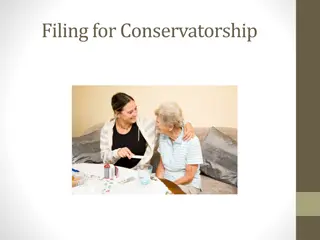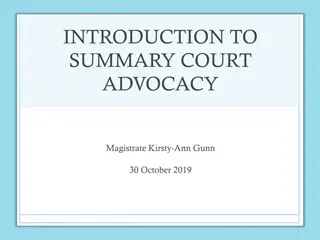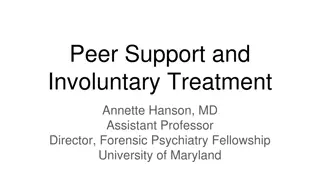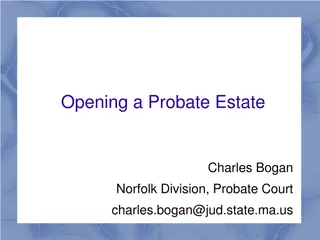Understanding Mental Health Laws and Procedures in the Probate Court
Explore the intricacies of mental health laws and procedures in the probate court, including Senate Bill 43, emergency hospitalization criteria, and civil commitment processes. Discover who can issue a Pink Slip, the role of probate courts in testing and treatment, and the legal measures available to address mental health concerns effectively.
Download Presentation

Please find below an Image/Link to download the presentation.
The content on the website is provided AS IS for your information and personal use only. It may not be sold, licensed, or shared on other websites without obtaining consent from the author. Download presentation by click this link. If you encounter any issues during the download, it is possible that the publisher has removed the file from their server.
E N D
Presentation Transcript
The Answers to Big Questions Who am I? Why am I here?
TWO WORDS SANDY HOOK NEWTON, CT AURORA, CO
PROBATE COURTS CAN Order testing for TB and HIV Order treatment for substance abuse over objection with a Doctor s order
Areas of the Probate Court that Address the Mentally Ill: Guardianships S.B. 43 Civil Commitments
What is S.B. 43? Senate Bill 43 allows people bring their mentally ill loved one to Court The petitioner asks the Court to order the mentally ill, non-complaint person into treatment There are a lot of rules
Senate Bill 43 (eff. 9-17-14) Mentally ill person subject to hospitalization by court order Why did they take out hospitalization ?
Emergency Hospitalization: Who can issue a Pink Slip? Police Officer Psychiatrist Licensed Clinical Psychologist Medical Doctor Parole Officer Health Officer* *any public health doctor, nurse, or person authorized by a city or ADM board to perform the duties of a health officer.
The Criteria for the Affidavit: Substantial risk of physical harm to self Substantial risk of physical harm to others Substantial immediate risk of serious physical injury to self via evidence of not providing for basic needs Would benefit from tx due to a history of lack of compliance with mental health tx and either: 1. Two hospitalizations within thirty-six months prior to filing the affidavit; OR 2. Lack of compliance with tx within forty eight months prior to the filing of the affidavit resulted in one or more acts of serious violent behavior toward self or others
The Civil Commitment Process Step 1 Examination by a Doctor within 24 Hours If found to meet the definition of mentally ill person subject to court order the person may be held up to three days The medical director can file an Affidavit of Mental Illness with the Probate Court
I think the dosage needs adjusting. I'm not as happy as the people in the ads.
The Civil Commitment Process Step 2 The Probate Court then issues a temporary order of detention and schedules a hearing No more than two days after receiving the affidavit, the Probate Court must refer the affidavit to the ADM board to assist the Court in determining whether the person is subject to court order, or if there are less intrusive alternatives available An attorney from the ADM board appears at the hearing to represent the board, who is seeking the commitment
The Civil Commitment Process Step 3 If the Court finds, by clear and convincing evidence, that a person is mentally ill subject to court order the court must order the person for a period not to exceed 90 days to ANY of the following: 1. A state mental hospital 2. A nonpublic hospital 3. The Veterans Administration or other agency of the United States Government 4. An ADM board or agency the board designates 5. Receive private psychiatric or psychological care 6. Any other suitable facility or person consistent with the diagnosis, prognosis, and treatment needs of the person
Summit County Commits its Residents to the County s ADM Board If the Court finds, by clear and convincing evidence, that a person is mentally ill subject to court order the Summit County Probate Court orders the person committed to the ADM board for 90 days Upon release from the hospital CSS New Day Court
Requires Treatment Plan for Outpatient Commitments The treatment plan means a written statement of reasonable objectives and goals for a person established by a treatment team, with specific criteria to evaluate progress towards achieving those objectives. The participation of the person in establishing the objectives and goals must be documented. The treatment plan must include services to be provided to the person while hospitalized, after discharge, or in an outpatient setting. The treatment plan must address services to be provided which include, but are not limited to: Community psychiatric supportive treatment; Assertive community treatment; Medications; Individual or group therapy; Peer support services; Financial services; Housing or supervised living services; Alcohol or substance abuse treatment, and Any other service prescribed to treat the patient s mental illness and help them to function in the community and prevent relapse.
Non-Compliance with Treatment If the person receiving court ordered outpatient treatment fails to comply with the treatment plan, or begins to decompensate, the treatment provider may submit a report to the court. The court will schedule a hearing to review the case and notify the ADM board. At the hearing, the treatment provider must submit a report to the court with a plan for appropriate alternative treatment, if any, or recommend that the court discontinue the court-ordered treatment. The court must consider available and appropriate alternative placements but cannot impose criminal sanctions that result in confinement in a jail or other local correctional facility based solely on the person s failure to comply with the treatment plan.
Continued Commitment After the expiration of the court s 90 day order, an application for continued treatment can be filed if there is a reason to believe the person still meets the criteria for court ordered outpatient treatment The court holds a hearing on the continued commitment and if it finds by clear and convincing evidence that the person is mentally ill subject to court order the Court may order continued commitment If continued commitment is ordered, the Court must hold a full hearing at least every two years after the expiration of the first 90 day period
New Day Court Proposes to work with those who have been civilly committed to a hospital and are going home Modeled on the mental health court Would involve the court in assisting patients to remain medication compliant C.I.T, Psychiatric Emergency Services, ADM Board and CSS Treatment plan in real life
How it Works: Patient is in court within 14 days of release from a hospital. All participants are seen in the Court together Judge is on the bench in a robe. There is no formal record Patient appears with case manager and family if present Chat with patient about progress and problems Those doing well are seen first, then those with difficulties and last are the new patients Rewards include longer time between court visits and movie tickets or other treats Senior representatives from CSS and ADM are present
Court Liaison Employed by the Probate Court Works with other agencies Handbook for new patients Schedules appearances Orders/monitors capiases Most importantly: Collects information and collates it into a briefing sheet, or informal docket for the Judge
The Role of the Judge Why do I sit on the bench in a robe? Superior Guardian role Affirmation and coaching Problem solving
And Now3 Minutes of Shameless Promotion
Why we LOVE our model Reproducible using current community resources We are very fortunate to have many resources, but the model can be built anywhere there is a mental health service provider with case management It does not require a dedicated judge or additional staff at the Court or in the other agencies Does require billing flexibility and additional support from our ADM board Satisfaction for stakeholders who are seeing success
and its about Recovery Based on therapeutic jurisprudence concepts There is a beginning and an end Individualized plan through steps Black Robe effect is only one part Public Acceptance Peer success is visible HOPE!! PS. There is NO problem with HIPPA
CURRENT STATISTICS 275 PATIENTS HAVE ENTERED THE PROGRAM SINCE INCEPTION 168 HAVE GRADUATED AND 12 HAVE GONE THROUGH THE PROGRAM TWICE 34 HAVE GRADUATED SINCE JANUARY 21 PATIENTS JOINED THE PROGRAM IN MARCH, 2018 A HANDFUL ARE COMING FROM THE CRIMINAL MISDEMEANOR SYSTEM.
Our Model is not Perfect Continued Commitment issues Psychiatrist shortage Some patients take off Some will never be able to understand or accept their illness We are now a victim of too much success
Summit County Statistics Since the start of New Day Court in January 2016, we have had a total of 152 clients. Released after 90-day commitment expired: 84 Hospitalized while on OPC: 14 Hospitalized and recommitted after OPC expired: 7 Current Active clients 58 We have yet to use the 5th criteria.
Judge Elinore Marsh Stormer SUMMIT COUNTY PROBATE COURT 209 South High Street Akron, Ohio 44308-1616 Email: probatejudge@summitohioprobate.com Phone: (330) 643-2330























